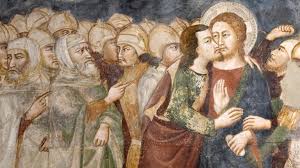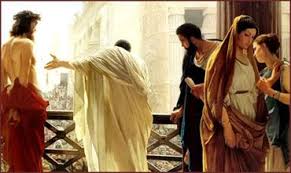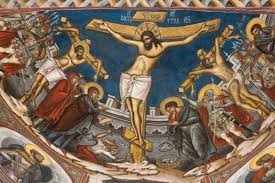![]() Gospel Readings: 1 John 13:31-18:1, 2 John 18:1-29, 3 Matthew 26:57-75, 4 John 18:28 -19:16, 5 Matthew 27:3-32, 6 Mark 15:16-32, 7 Matthew 27:33-54, 8 Luke 23:32-49, 9 John 19:25-37, 10 Mark 15:43-47, 11 John 19:38-42, 12 Matthew 27:62-66
Gospel Readings: 1 John 13:31-18:1, 2 John 18:1-29, 3 Matthew 26:57-75, 4 John 18:28 -19:16, 5 Matthew 27:3-32, 6 Mark 15:16-32, 7 Matthew 27:33-54, 8 Luke 23:32-49, 9 John 19:25-37, 10 Mark 15:43-47, 11 John 19:38-42, 12 Matthew 27:62-66
I will not (believe me!) comment on each of these readings, which carry the story from Holy Thursday evening through Holy Saturday evening.
Please try to worship live-stream tonight. Be prepared for well over two hours. I have never felt the story of our Lord’s Passion more strongly than at this intense service.
First, two things:
1 If you follow all the services during the next two days, you will find much repetition in the Gospel readings. When I was first Orthodox, it nearly drove me up the wall. I thought Wasn’t once or twice enough? Eventually I understood: the Church is trying to drum this life-giving story of our Lord’s Passion so deep into our heads and hearts that it is just part of us. It works.
2 The first reading in the Twelve Gospels service goes on seemingly forever. Christ’s last teachings and then His prayer to His Father – I think one could take a lifetime just to absorb it all. But don’t give up: each of the Twelve Gospels then progressively get shorter.
Here I will try to provide a brief overall narrative of the events. In this conflation of the events I’ll omit much *, and hope I have not got anything out of order. Sometimes it’s hard to precisely harmonize the Gospel accounts.
- Unless I’ve missed something, the story of Christ’s “command performance” before King Herod is never read. I wonder why.
Picking it up early on Holy Friday morning: Jesus had been captured during the night in the Garden of Gethsemane, and taken in custody and mistreated while waiting for the  Jewish Sanhedrin, their high court, to gather. Meanwhile, Simon Peter had thrice denied that he even knew Jesus, then had fled, crying bitterly, so ashamed of himself.
Jewish Sanhedrin, their high court, to gather. Meanwhile, Simon Peter had thrice denied that he even knew Jesus, then had fled, crying bitterly, so ashamed of himself.
So Jesus had been left to face it alone – till later in the day when His Mother Mary, young John and the holy women would bravely stand with Him at the foot of the Cross.
The Lord had been condemned to death by the Sanhedrin on grounds of blasphemy, “making himself equal with God”. (And if He was not who believe Him to be, if He was a madman, then their verdict was correct and the Jewish authorities were not just evil men, as I said on Palm Sunday.) However, Israel was an occupied country, and the Romans forbade them to execute anyone. So they had no choice but to cooperate with the enemy.
The priests took Him to Pontius Pilate the Roman governor. The Romans couldn’t have cared less about blasphemy against this peculiar God of the Jews, so the Jewish authorities were forced to lie about Jesus. They gathered a crowd on the Gabbatha, ![]() the pavement in front of the Praetorium, the governor’s palace, telling Pilate that this Jesus was making himself a king. This was treason, and something had to be done about it. Pilate understood none of this and probably was irritated by being awakened so early by all this commotion – couldn’t they have waited till later in the day?
the pavement in front of the Praetorium, the governor’s palace, telling Pilate that this Jesus was making himself a king. This was treason, and something had to be done about it. Pilate understood none of this and probably was irritated by being awakened so early by all this commotion – couldn’t they have waited till later in the day?
But he needed to settle things down, so he interviewed Jesus: “You are a king then?” Jesus gave a very odd answer: “You have said so” – that is, Yes. But then He continued, “but my Kingdom is not of this world.” John 18:36 Pilate was perplexed, but saw no threat in this humble, quiet, very unkinglike man. He went out and announced that he found no fault in the man and so he would release him. “No! Crucify him!” came the crowd’s response. Now Pilate was more perplexed, so he had Him beaten, thinking maybe this would satisfy them. It didn’t. “Why?” asked Pilate, “what evil has He done?” “Crucify Him! Crucify Him!”
Were these the same people who had welcomed Him on Sunday with “Hosanna”? Likely not. Why would ordinary folks be here at dawn on a workday? Had this crowd been gathered for the event, paid off by someone? Perhaps. However, we also know well that almost any group of people, when cleverly riled up, can turn into an irrational mob. Whatever the cause, they chose a criminal rather than an innocent Man. It had happened before in history. It would happen many times again.
Meanwhile Pilate’s wife sent a message. She had had a dream about this man: “leave him alone”. Pilate was now at his wits’ end. Now he had not only to settle  these unruly incomprehensible people, but also not offend his wife! So he tried again. He had Jesus dressed up sort of like a king. He brought Him out: “Behold, the man”, said Pilate. (No truer words were ever spoken. Here was Man brought to fulfillment, completion. No other true Man had ever been born.) Pilate thought surely they will now see that this meek, mild-mannered man is no king. “Crucity Him! Crucify Him!” “Crucify your king?” asked Pilate, in a half-taunting, half-jocular way, half-hoping maybe he could still work his way out of this.
these unruly incomprehensible people, but also not offend his wife! So he tried again. He had Jesus dressed up sort of like a king. He brought Him out: “Behold, the man”, said Pilate. (No truer words were ever spoken. Here was Man brought to fulfillment, completion. No other true Man had ever been born.) Pilate thought surely they will now see that this meek, mild-mannered man is no king. “Crucity Him! Crucify Him!” “Crucify your king?” asked Pilate, in a half-taunting, half-jocular way, half-hoping maybe he could still work his way out of this.
The Jewish authorities must have been prepared for it, for now they took their lie a step farther: “If you let this man go you are no friend of Caesar’s. Whoever makes himself a king speaks against Caesar.” John 19:12 And so they were the ones who would blaspheme God: “We have no king but Caesar” – they whose only true King was and had always been the Lord God of Israel.
Pilate knew he was trapped. What if word got back to Rome that he had let a treasonous man go free? And so, fearing now for his own position as governor… You know the rest: “…and was crucified also for us under Pontius Pilate.” If Pilate could have known that those words would be his only legacy, proclaimed in a hundred thousand churches 2000 years later…
The evidence is that Pilate tried hard to satisfy his conscience – so much so that the Ethiopian Orthodox Church lists him on their calendar at Saint Pontius Pilate! But I don’t think so. We all know many politicians, very many, who are willing to lose their honor so as not to lose their jobs. Nor did the rest of Pilate’s life give evidence that he was a saint.
So in the end, here it was. The religious leaders violated their own Law and their conscience. The politician violated his own sense of justice and his conscience. And both powers, working together, executed God.
A cause to grieve, to mourn? Yes, at how evil, how horrible this world can be.
But NO! This is above all a cause to rejoice! Because the powers of the fallen world have now done their worst: They can’t do worse than kill God in the flesh. And it did not work!
Christ arose. He could not be put down. And so, despite appearances sometimes, despite our despair sometimes, the truth is that the salvation of the world is now assured. The world has tried its hardest and it can never get rid of God, of Christ our God, or of His holy Body the Church.
And now Jesus Christ, our God and Savior, will die and enter into hades to do His most important work. He will conquer death by death, from the inside, and set free all the dead from all times, and lead us all into death with Him, through death and out the other side.

God so loved the world that He gave His only begotten Son that whoever believes in Him should not perish but have everlasting life. John 3:16
Greater love has no man than this, than that he should lay down his life for his friends. John 15: 13
When we were still weak, at the right time Christ died for the ungodly… Perhaps for a good man someone would even dare to die. But God shows His love toward us, in that while we were still sinners, Christ died for us. Romans 5:6-8
In this is love, not that we loved God but that He loved us and sent His Son to take away our sins. Beloved, if God so loved us, we also ought to love one another. I John 4:10-11
Tomorrow: Holy Friday afternoon Great Vespers, Holy Friday evening Lamentations Service